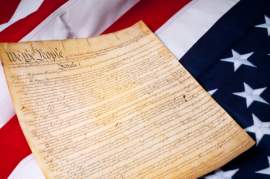
The Significance of Our Founding Fathers

Popular In Constitution
Purpose Of Lifetime Appointment And Pros And Cons Enumerated Powers Bicameral Legislature Background Article 3 Of The Constitution We The People 1st Amendment Who Wrote The Constitution Judicial Review Equal Protection Clause 5th Amendment 10th Amendment Three Fifths Compromise
Significance
of Founding Fathers for Constitutional Law
In the context of American Constitutional law, the
Founding Fathers can be noted as comprising of delegates to the Constitutional
Convention, the meeting held in Philadelphia in 1787 with the effect of drawing
up the U.S. Constitution. In the larger context of U.S. history, the Founding
Fathers might be noted as the specific individuals who took part in this and in
other essential points for the creation of the nation, including both its
liberation from the control of the British Empire and the further consolidation
of the 13 colonies into a nation unified under the Federal Government.
Other Historical Settings for Founding Fathers
Along with the list of the 55 delegates to the
Constitutional Convention, the other main listing of Founding Fathers
maintained as to specific and historically significant individuals can be noted
as comprising of the 56 signers of the U.S. Constitution.
Larger Context for Founding Fathers in U.S. History
The “Founding Fathers” terminology might further
be applied to the large group of men who contributed to the early history of
the United States, without necessarily holding high office at the time or
finding individual fame in the long term. Moreover, a category similar to that
of the Founding Fathers might also be proposed using gender-neutral language in
order to account for the role played by women in the nation’s early history.
Historians believe that U.S. President Warren G. Harding first introduced the “Founding Father” terminology, prior to his assuming the Presidency, as keynote speaker to the 1916 Republican National Convention.
NEXT: The Supreme Court Overview




















